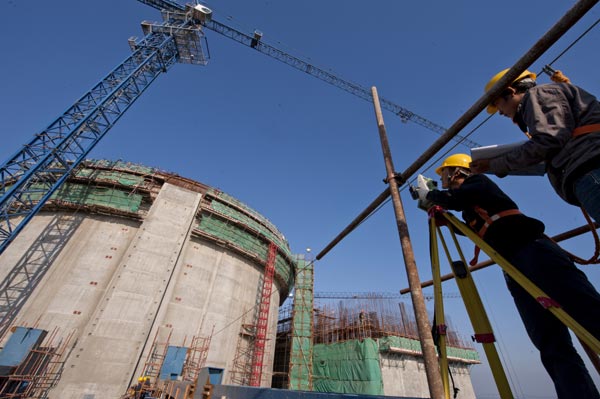NSS 2016: nuclear security cooperation to continue
- By Sumantra Maitra
 0 Comment(s)
0 Comment(s) Print
Print E-mail China.org.cn, March 28, 2016
E-mail China.org.cn, March 28, 2016
|
|
|
The Fuqing nuclear power plant is under construction. [Photo / China Daily] |
The Nuclear Security Summit 2016 comes at a high time, scheduled from March 31 to April 1 in Washington DC. This is the fourth summit of its kind, and aims to discuss security issues related to fissile material. Readers must be aware that the NSS has been quite successful in motivating participants to improve their internal security while removing highly enriched uranium from over 12 countries, and inciting a conversion to low energy uranium as well as comprehensive improvement in the security of buildings and storage of fissile material. This time, the NSS is supposed to focus on improving the coordination of the top five nuclear security administration bodies, namely, the International Atomic Energy Agency (IAEA), United Nations (U.N.), INTERPOL, Global Initiative to Combat Nuclear Terrorism (GICNT), and Global Partnership against the Spread of Weapons and Materials of Mass Destruction (Global Partnership). There's supposed to be action plans for each of these bodies.
There are talks of amendments in the guidance of nuclear security measures, as well as the strengthening of international frameworks. Interpol is supposed to formulate an action plan which will focus on enhancing and expanding existing training courses and exercises to prevent or act on nuclear or radiological incidents, and start an Operation Fail Safe initiative which is supposed to track nuclear smuggling.
U.S. President Obama and his Chinese counterpart Xi Jinping are supposed to meet on the sidelines of the NSS this year. Chinese Vice Foreign Minister Li Baodong was quoted saying that North Korea, cyber security and the South China Sea will be definitely among some of the issues mentioned. President Xi is supposed to deliver a speech on China's domestic measures and new achievements in enhancing nuclear security, and raise a number of practical proposals on strengthening global nuclear security, Xinhua stated. These are the consistent positions of China. Last year, China also stated that there should be nuclear accountability, and even contribution from all parties concerned when it comes to boosting nuclear security across the globe. There have been new challenges in capacity building, which need to be addressed as well, and also the fact that member states should be held accountable, especially member states from countries which have traditional law enforcement and security problems. "China will work with parties concerned to make contributions to the construction of a fair, cooperative and win-win international nuclear security system and improve the levels of global nuclear security," said Li, quoted by Xinhua. The Chinese position on the Korean question has also been extremely consistent; China and the United States both agree on the need to denuclearize the Korean peninsula, and both understand the need to do it peacefully and through dialogues.







Go to Forum >>0 Comment(s)